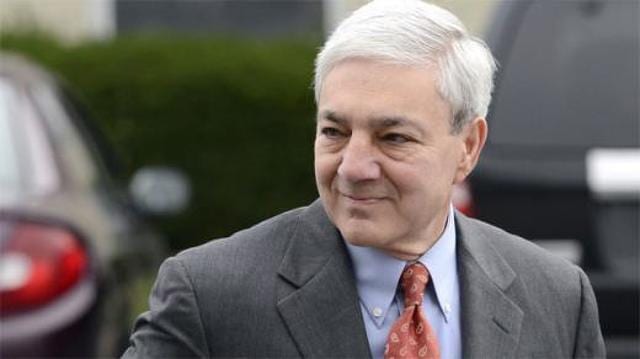Philly.com reported on Thursday that the foreman of the jury that found former Penn State President Graham Spanier guilty on one count of child endangerment said that verdict was a ‘mistake’ and that he that he was conflicted about changing his vote from not guilty.
The foreman, identified by Philly.com as 78-year-old retired truck driver Richard Black, told the site that as deliberations neared their end, he was the last juror holding out with a not guilty vote. Had he not changed his vote, it could have resulted in a mistrial.
Black said he would tell Spanier ‘I’m sorry,’ though the site reports he has ‘made peace’ with the jury’s decision. He told the site that the jury came to its decision through serious deliberations and that they ‘did what they were asked to do.’
Spanier was found guilty of one misdemeanor count of endangering the welfare of children and acquitted of felony charges of child endangerment and conspiracy. The Dauphin County jury convicted on a misdemeanor and not a felony because it did not find a pattern of conduct in Spanier’s actions.
Spanier, along with former athletic director Tim Curley and vice president Gary Schultz, were charged for their handling of a report by former Penn State assistant Mike McQueary of seeing Jerry Sandusky with a boy in a locker room shower. All three administrators have said they were not told of anything sexual, though Schultz testified they were told McQueary saw Sandusky naked with his arms around the boy.
“I don’t think Graham Spanier knew,” Black told Philly.com. “They did not … make him understand how serious a condition this might be.”
Black said that had Spanier testified he likely would not have changed his vote to guilty. Spanier’s attorney, Sam Silver, did not call any witnesses at the trial.
Curley and Schultz pleaded guilty on March 13 to one count each of misdemeanor child endangerment. As part of their pleas, they testified for the prosecution at Spanier’s trial. Both said they wish they had done more to report Sandusky in 2001. All three face a maximum sentence of five years in prison, though state sentencing guidelines recommend probation to less than a year for first-time offenders.
Earlier this week, another member of the Spanier jury, Victoria Navazio, told the Associated Press that Spanier’s own words in emails among the three administrators in 2001 played a significant role in the conviction.
In those emails, Curley suggested that they tell Sandusky not to bring children to the locker rooms and to seek professional counseling and that they inform the director of Sandusky’s Second Mile charity for at-risk youth. Curley wrote he had become ‘uncomfortable’ with a previously agreed-upon step of informing the Department of Public Welfare.
‘The only downside for us is if the message isn’t ‘heard’ and acted upon, and then we become vulnerable for having not reported it,’ Spanier wrote in reply. ‘But that can be assessed down the road. The approach you outline is a humane and reasonable way to proceed.’
“How else can you take that, other than they knew they should have been reporting it?” Navazio told the AP. “Obviously he knew children were at risk for something. He knew there was a problem.”
Prosecutors argued that by not reporting Sandusky, the administrators allowed him to continue to sexually abuse children for years.
Sandusky was convicted in 2012 on 45 counts of child sexual abuse and sentenced to 30 to 60 years in state prison. He maintains his innocence and continues to appeal.



